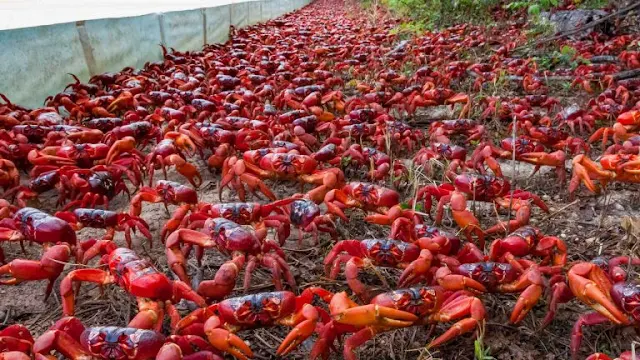Planet Earth II (BBC Documentary; 2016)

We, h
uman beings, are convinced that we are the chosen one. We like to think that our cognitive function is well developed. We move with a chip on our shoulders, convinced that God created the Universe for us alone. Just because our neo-frontal cortex has developed much over the ages, we think we are special. Deep inside, when we scrutinise our distant ancestors, we are not much different. Our primal desires, needs and wants are still the same. Just like members of the animal kingdom, we fight for territory, food and mate. Unlike them, however, we also kill our fellow kind and animal kind indiscriminately in the name of sports, recreation and surge of mental derangement.
This BBC produced documentary can easily be described as the best documentary ever done; at least among the ones that I have ever seen. In six one-hour episodes, the makers take our focus to all four corners of the world. We are taken away, in the comfort of our arm-chairs, to witness first-hand, the experiences of animals in various environmental situations. We see them in islands, mountains, jungles, deserts, grasslands and the newest addition, the concrete jungles, the cities.
Using modern and sophisticated avant-garde photography; hidden cameras, night-vision cameras, drones and traditional wait-and-see techniques; the end result is simply out of this world. Many of the views are breathtaking and will be imprinted in the viewers' minds for years to come. Here are a few...
- The hatchlings of marine iguana, a sea-dwelling creature in Galapagos Island. As they rush to the sea as soon as they crack out of their shells, they have to outwit and outrun a bed of snakes to reach the sea. Only the strongest survive.
- Pigmy sloth search for mates in a dwindling population.
- Red crabs in Christmas Island as they make an epic journey to the seas.
- The story of a million penguins in Zavodvski Island off the Southern Seas and their struggle with the rough seas for food.
- The agile Nubian Ibex and their mountain climbing skills.
- The lonely snow leopards who adapt to live in extremely trying surroundings on the edge of existence.
- The ruthless Bob Cats of the wild.
- The amazing Mount Kenya (17,000ft.) which is the only mountain on the Equator which is snow-capped as water freezes overnight and melts in the day as the sun rises.
- The elusive freshwater river dolphins of the Amazon.
- The minute glass frogs.
- and many many more...
Nature has its own way to ensure the species become stronger and smarter. Many of the hostile elements of the environment ensure this. Perhaps, Man would lose out on this as their offspring are increasingly mollycoddled and protected well into adulthood. One can argue that human's increasing innovation skills reliefs him from the curse of survival of the fittest and the strongest. Sometimes I wonder if the presence of different seasons and extremes of weathers makes one stronger?
As more and more cities spring up, animals' habitats are compromised and they too need to migrate to the city. In many places, they live in harmony with Man. Many monkeys live scavenging food. Some are revered for their godly statuses in the scriptures. In Ethiopia, hyenas live off carcasses served by city-dwellers. Singapore, after embarking on an ambitious project, has managed to increase the variety of their fauna and flora. It can boast of being the city with the most number of species of plants. It has also attracted old species of animals that were thought to extinct on the island.
A gripping documentary with surreal, sometimes hyperreal view of Nature belying the dangers that lurk in the wild.
 |
| Marine Iguana |
 |
| Komodo Dragon |
 |
| Concrete structures in Singapore to enrich flora and attract fauna back to the city. |
 |
| Chin-strap Penguins of Zavodvski Island. |
 |
| Dancing Flamingos |
 |
| Miniature glass frog of the Amazon. |
 |
| Red Crab March in Christmas Island. |
 |
| Nubian Ibex, mountain goat. |
















No comments:
Post a Comment